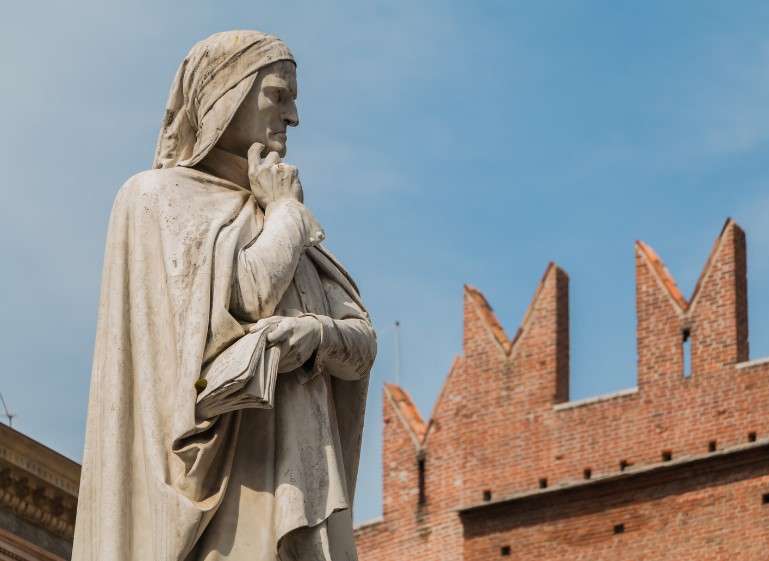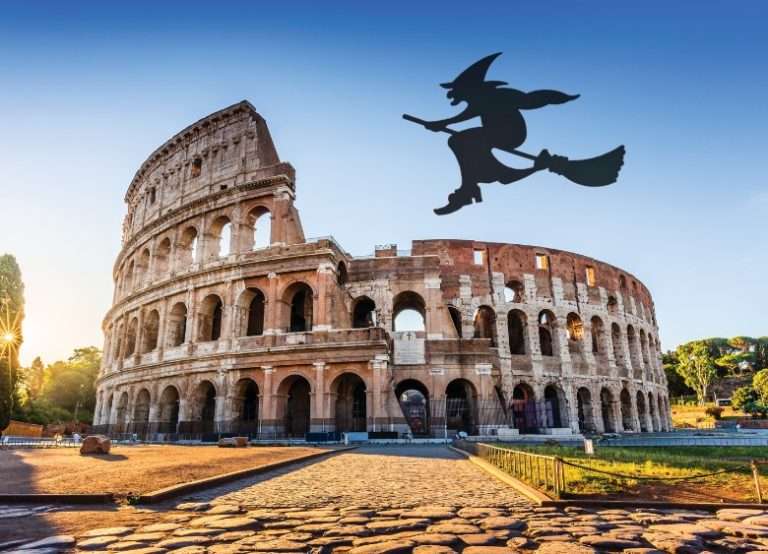Dante Alighieri Interesting Facts: Italy’s Greatest Poet
Ciao, fellow lovers of Italy and its rich cultural heritage! Today, we’re diving into the life of a man who played a monumental role in shaping the Italian language and literature – the incomparable Dante Alighieri.
You might know him as the author of “The Divine Comedy,” one of the world’s most celebrated literary masterpieces.
However, there’s so much more to discover about this incredible figure. So, join us as we explore some interesting facts about Dante Alighieri and uncover the secrets behind the man who changed the course of Italian literature forever.
Planning a trip to Italy? Read our curated selection of the best travel books for Italy.
Dante’s Early Life and Family Background
Our journey begins in the beautiful city of Florence, where Dante Alighieri was born in 1265. Born into a prominent Florentine family with a long history of political involvement, Dante was destined for greatness from the start.
His father, Alighiero di Bellincione, was a respected White Guelph, one of the two factions involved in the political struggles of the time. Despite the family’s political affiliations, they were not among the wealthiest, but their influence was undeniable.
One of the most well-known Dante Alighieri facts is his love for Beatrice Portinari, a young woman he met when he was nine. Dante’s adoration for Beatrice was so intense that she became his muse, inspiring much of his poetry.
Although they had little contact and Beatrice married another man, Dante’s love for her remained undiminished, even after her untimely death at 24.
Suggested Reading: Italian Men: 20 Things to Know When Dating in Italy
Dante’s Political Life and Exile
As Dante grew older, he became increasingly involved in the politics of Florence, following in his father’s footsteps. He aligned himself with the White Guelphs, who were in constant conflict with the rival Black Guelphs. The struggle between the two factions ultimately led to Dante’s undoing.
In 1301, the Black Guelphs, backed by Pope Boniface VIII, took control of Florence, and Dante was accused of corruption and fraud. He was sentenced to exile, and his property was confiscated.
This marked the beginning of a long and difficult period for Dante, who spent the rest of his life wandering from city to city, searching for refuge. Despite the hardships he faced, exile became a crucial turning point for Dante’s literary career, as it was during this time that he began writing “The Divine Comedy.”
The Creation of “The Divine Comedy”

“The Divine Comedy,” or “Divina Commedia” in Italian (with “divina” meaning divine), is Dante’s most famous work and one of the most significant pieces of world literature.
The epic poem, written in the vernacular Italian language, is divided into three parts: Inferno, Purgatorio, and Paradiso. These three realms of the afterlife are explored by Dante as he journeys through them, guided first by the Roman poet Virgil and later by his beloved Beatrice.
One of the many intriguing Dante Alighieri interesting facts is the importance of the number three in his work. “The Divine Comedy” is divided into three parts, each containing 33 cantos, except for Inferno, which has an additional introductory canto.
This structure reflects the Holy Trinity, further emphasized by the use of “terza rima,” a rhyme scheme featuring interlocking three-line stanzas.
By writing “The Divine Comedy” in the Italian vernacular instead of Latin, Dante paved the way for other authors to follow suit. This decision played a critical role in the development and standardization of the Italian language and made the work more accessible to a wider audience.
Dante’s bold choice to write in Italian demonstrated his belief in the beauty and expressive power of his native language, which would have a lasting impact on Italian literature.
Recommended Reading: 17 Best Italian Books: Explore Italy’s Rich Culture
Dante’s Unique Literary Style and Influence
The genius of Dante Alighieri’s work goes beyond his choice of language; his innovative use of the terza rima rhyme scheme also sets him apart from his contemporaries.
Terza rima, characterized by its interlocking three-line stanzas with an ABA BCB CDC rhyme pattern, lends a sense of harmony and continuity to the poem. Dante’s mastery of this form has inspired countless poets who came after him, including Geoffrey Chaucer, Percy Bysshe Shelley, and T.S. Eliot.
Dante’s contributions to the Italian language and literature are immeasurable. “The Divine Comedy” catalyzed the standardization of the Italian language, eventually leading to it becoming the language of culture and art in Italy.
Recommended Reading: 30 Interesting Facts About the Italian Language
Moreover, the themes and motifs explored in Dante’s work have continued to resonate with authors and artists throughout the centuries. From Botticelli’s illustrations to Rodin’s sculptures and even modern-day adaptations, Dante’s influence on Western art and literature is undeniable.
Little-Known Interesting Facts About Dante

To wrap up our exploration of Dante Alighieri’s interesting facts, let’s delve into some lesser-known tidbits about the life and work of this extraordinary poet:
1) Dante is believed to have met several famous figures of his time, including Giotto di Bondone, the renowned Italian painter, and Giovanni Villani, the chronicler of Florence.
2) Although Dante’s final resting place is in the city of Ravenna, there has been much speculation and debate about the whereabouts of his bones. Some believe that Franciscan friars hid his remains to protect them from being destroyed by the papacy.
3) Dante’s lost love, Beatrice, has inspired numerous artistic representations throughout history. Artists have portrayed her like Dante Gabriel Rossetti, Henry Holiday, and Salvador Dalí.
4) In 2008, a reconstruction of Dante’s face was completed by Italian scientists using measurements taken from his skull. The result was a surprisingly accurate depiction of the poet, whose features had been previously known only through artistic interpretations.
Our journey through the fascinating Dante Alighieri interesting facts has ended, but the allure of this Italian literary giant lives on. From his early life in Florence to his exile and the creation of “The Divine Comedy,” Dante’s story is a testament to the power of art and the resilience of the human spirit.
As you continue to explore the wonders of Italy through “The Italian Way of Life,” we hope you’ll carry with you the inspiration and passion that Dante Alighieri brought to the world of literature.
Further Reading:







